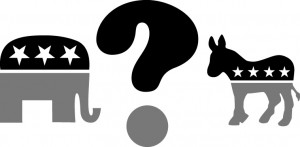Written by: Kara Hemphill
With the next presidential election just a couple of weeks away, it’s no surprise that politics have been getting more attention from the media and the public alike. This is the first presidential election in which many undergraduates will have the opportunity to vote. It may be the only election that some vote in, while more won’t vote at all.
The problem with this election is that, to many, it seems like a lose-lose situation. The change that President Obama promised fell short in the eyes of many Americans, and Romney is, well, Romney.
Perhaps some voters identify more with Jill Stein of the Green Party, Gary Johnson of the Libertarians, or Virgil Goode of the Constitution Party. More likely than not, though, the majority couldn’t even name all three of them.
It’s pretty common knowledge that we effectively have a two-party system in the U.S. Although there are third parties, they don’t have enough support to consistently win elections the way Republicans or Democrats do.
The result is a sort of political dichotomy: two parties fighting it out and often, it seems, refusing to compromise to reach a viable solution.
In theory, systems with multiple parties — like in Sweden or Germany — should have to compromise more, because a single party can’t control a legislative body.
All political systems have their pros and cons, but we seem to have come to a stagnation of ideas here in the U.S. Attack ads, for example, play on our fears, pointing out the worst in the opposing candidate while absolving the candidates from addressing things head-on.
It’s easier to say “This guy will ruin the country” than it is to say “Here’s what I’m going to do to make the country better.”
Regardless of political views, watching this back-and-forth of insults and asinine campaign tactics can be exhausting, especially if you aren’t normally invested in politics.
“It’s always going to be a choice between the lesser of two evils,” said Emma Masen, a communication major.
Or, as another undergrad said bluntly: “They both suck.”
Of course, there are more refined criticisms of these candidates, but many people would admit to throwing their hands up in frustration and wanting to call it quits from time to time.
Sadly, that’s not really an option either — unless you really don’t care who takes the reins come January. Most polls show Obama in the lead, but among those who actually plan to vote, the race is much closer.
And from jobs to financial aid to healthcare, and even foreign policy, this election is especially important to college students.
A third-party candidate isn’t going to win this election, but they have thrown elections in the past by siphoning votes from the two main parties. Such is the sad reality of our political system: votes are usually best spent on “the lesser of two evils.”
It’s not perfect, but change isn’t going to happen overnight. We have to work for it, even if we don’t like some of the stops along the way.
With the race so close, this election isn’t the place to take a stand and vote for a third party. Most likely, doing that will only help the guy you like the least, be it Mitt Romney or Barack Obama. But change is never out of the question, especially if you’re willing to work for it. After all, there’s always room for improvement.







HarryJoseph • Oct 28, 2012 at 3:20 PM
I often wonder how many college students have the time to do any research on the candidates and just go by what they hear. In Obama’s case, many people totally ignored his work background as a community organizer in Chicago for around four years. I only knew that he was an Alinsky follower. When I found the following web site and bought the book to make sure the summary of the book on the web was authentic, I knew I could never vote for Obama. Whether or not you plan to vote for him, you should take the time to read the summary of the book to see how he learned to make changes and what goals he has for our country.
http://www.crossroad.to/Quotes/communism/alinsky.htm